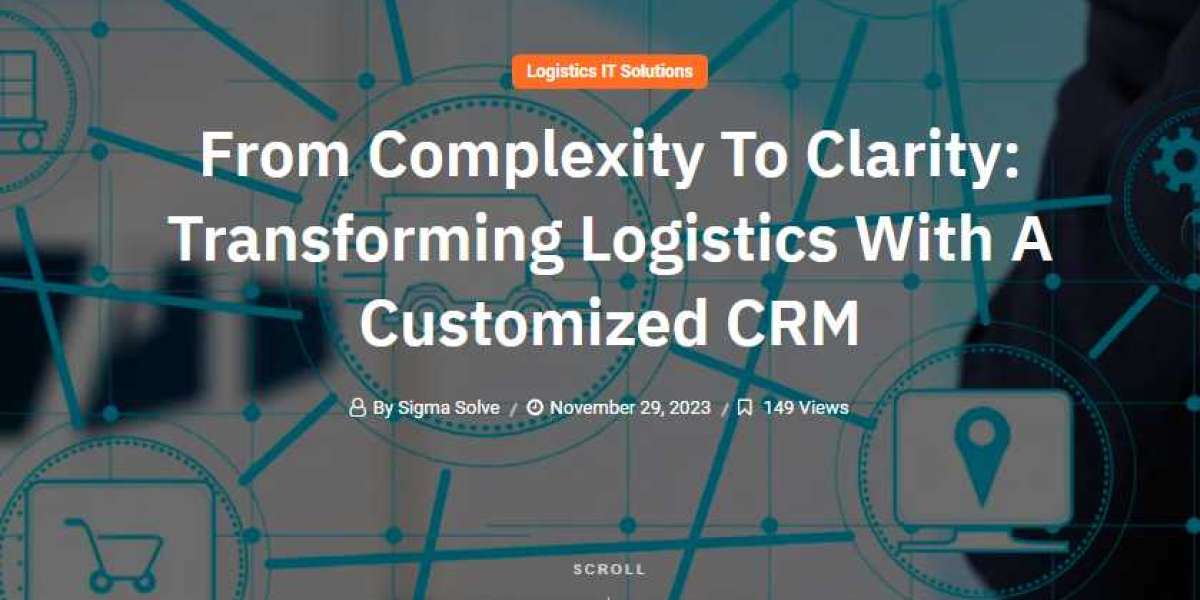Synopsis:
The logistics industry is one of the most critical economic drivers and contributes immensely to the GDP of the US. However, the sector has been elusive for emerging technologies. Because of ingrained labor systems, diverse workflows, and technological investment costs, brokers in logistics businesses have shied away from a technology-driven ecosystem.
At Sigma Solve, we understood the dire need for a technology-infused solution that eliminates logistics bottlenecks and streamlines business processes for brokers, who ensure common ground for shippers and carriers. The urge to simplify processes from leads to delivery is now paramount.
In this blog, we will explain how a custom CRM-integrated Transport Management System (TMS) removes complexities for brokers and builds a smooth workflow to improve load visibility, increase customer satisfaction, and realize a greater return on investment (ROI).
Logistics Pain Points:
Bereft of technological interventions, the logistics sector in the US is facing many challenges. The business processes in the logistics sector are delayed, broken, or slowed down. Unorganized lead flow increases back-office inefficiencies. Delays in communication adversely affect sales and revenue inflows. Complexities in integrating third-party solutions are proven to be prolonged obstacles. In an environment where efficiency is proportionate to profitability, streamlining workflow remains an elusive goal.
How Are Logistics Complexities Simplified?
As the digital world expands, there is no alternative to enhancing operational efficiency and customer experiences for businesses. Logistics businesses can’t remain aloof from emerging market trends, and surely not from technological advancement. Therefore, Sigma Solve has built a custom CRM to revolutionize logistics processes to improve customer relations and operational efficiency.
The custom logistics CRM is designed to reduce lead-to-order time, speed up end-to-end communication, eliminate inadvertent delays, and improve visibility along with customer experiences. This AI-powered CRM is also equipped with third-party functionalities to meet the specific needs of logistics businesses. With customization and scalability at the center, the custom CRM helps businesses reduce costs and realize exponential ROI.
Challenges in Logistics Processes
Systematizing Lead Flow:
Logistics businesses generate leads from various sources, and chances are that the volume of leads is extremely high. Managing and classifying leads in bulk poses a major challenge. The lead flow has a deep impact on the operational capabilities of the businesses. If logistics businesses do not adapt to technological solutions, they may lose great businesses and incur major revenue losses.
Communication Delays:
Being lightning fast is as important as being efficient in the logistics industry. Therefore, logistics businesses need to communicate really quickly without delays. However, time wastage is a major issue in the logistics sector. Irregular follow-ups, inadequate information sharing, and not being able to focus on every lead result in delivery disruption and adversely impact customer relations.
Conversion Time Reduction:
The longer logistics businesses invest in converting leads, the lower their chances of conversion. Often, logistics businesses have no means to allocate leads to the right person efficiently. Consequently, it leads to slippage through miscommunication and results in loss of business and revenue. Logistics businesses need automated business processes that distribute leads efficiently.
Swift Quote Sharing:
How quickly logistics businesses share pricing and other terms in a quote determines the amount of business! However, it is seen that lead nurturing is inadequate in the logistics industry. Delays in sharing quotes with shippers prevent them from making a quick decision, increasing customer dissatisfaction. Quote delays contribute to negative business reviews and losses in business.
Load Board Integration:
Cost-effectiveness matters the most while building custom enterprise software solutions. Hence, instead of developing a new solution, integrating third-party solutions reduces costs. However, legacy systems do not allow new technology to be assimilated, aggravating the problem of integration. Integrating other applications can enhance efficiency and optimize the entire system.
Order Deferment Complexities:
Delays in communication and quote sharing result in order deferments. Shippers often look to finalize carriers quickly but are prevented from making decisions. The misallocation of resources results in lost opportunities. The piling up of lost opportunities affects operational efficiency and supply chain disruptions, increasing costs and reducing revenue.
Remanifesting Transport Management (Features)
AI-powered Lead Distribution
Automatically distribute leads to the right salesperson based on his expertise. AI powers our Customer Relationship Management (CRM) solution to distribute leads quickly.
Agile Lead Management
Export leads in bulk, nurture them quickly, and track each lead to improve the lead-to-conversion ratio with our lead management system.
Automated Customer Communication
Send a text or email automatically to shippers as soon as the lead is generated to communicate quickly and convert the lead into an order in no time.
Prompt Quote Submission
Our custom CRM ensures that you should be able to submit your quote to shippers as soon as you send them text or email through various templates.
Load Board Integration
Our CRM provides a third-party marketplace right into CRM to push confirmed orders to carriers to finalize the driver and dispatch schedule.
Efficient Order fulfillment
Track each order on a load board or with a carrier under a centralized framework to dispatch on time and keep the shipper informed of his loads.
Precise Lead/Sales Reports
Our tailored CRM adequately generates leads, orders, and sales data to allow businesses to generate accurate reports that make precise business sense.
User Profile management
Store all details of shippers and carriers in one database to quickly facilitate lead to order and order to dispatch quickly and deliver satisfaction.
Fully Customizable
Streamline your business processes with fully customizable features. Our custom CRM solutions allows you the flexibility to tailor it to meet your specific needs.
QuickBooks Integration
We have integrated QuickBooks into our logistics CRM to record transactions securely, issue invoices to shippers, and collect online payments seamlessly.
Conclusion:
A custom CRM is widely used in the logistics industry for various purposes. For example, freight brokers use CRM to keep track of the communication history for lead nurturing and to maintain a handy database of clients. Meanwhile, logistics brokers use custom CRM to build and maintain long-term relationships with shippers and carriers and provide personalized experiences.
A custom CRM is capable of meeting the special needs of logistics businesses besides optimizing workflow, reducing costs, and improving ROI. At Sigma Solve, we strongly recommend embracing innovations that raise productivity levels and streamline and automate business processes.
For more info: https://sigmasolve.com/from-complexity-to-clarity-transforming-logistics-businesses-with-a-customized-crm/







